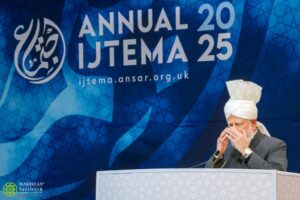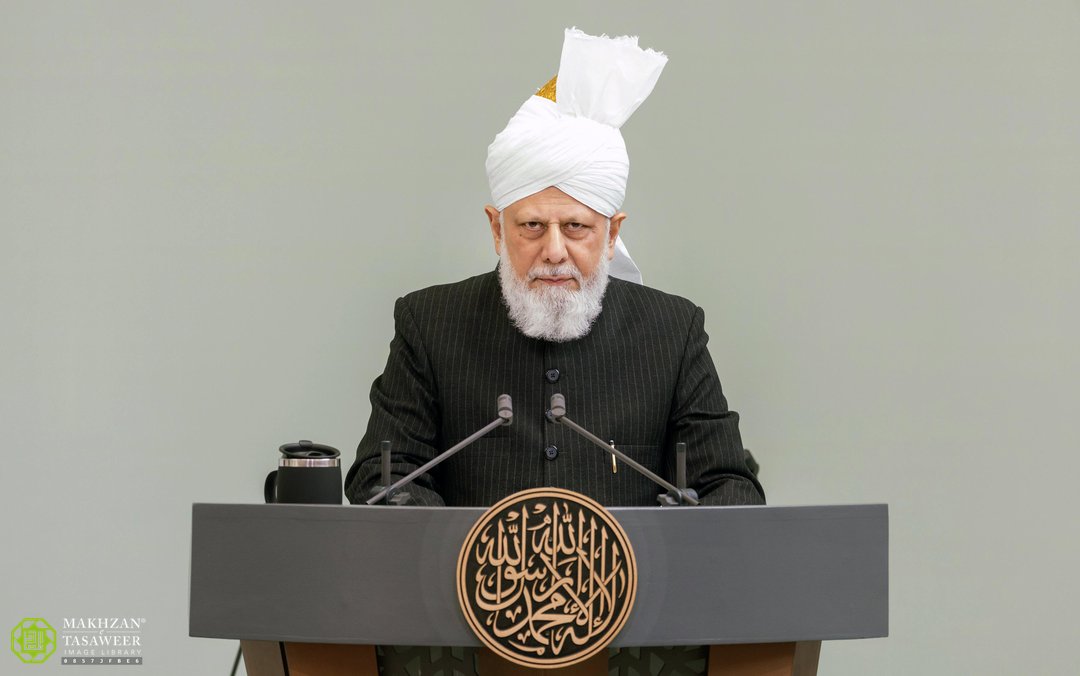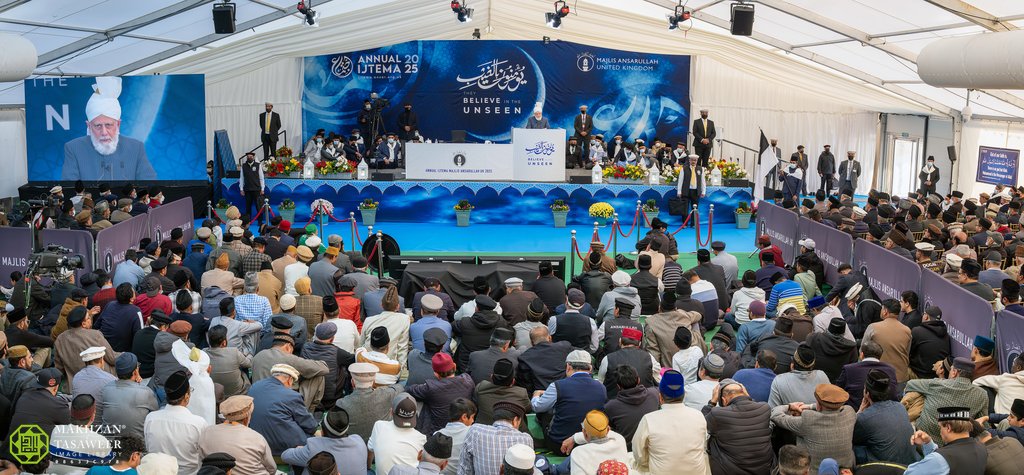
Head Of The Ahmadiyya Muslim Community Addresses The Concluding Session Of The National Ijtema Of Majlis Ansarullah UK
“Given the current situation of the world, it is necessary that we turn to Allah the Almighty and pay special attention to sending Durood (invoking salutations) upon the Holy Prophet (peace and blessings of Allah be upon him)” – Hazrat Mirza Masroor Ahmad
On 28 September 2025, the World Head of the Ahmadiyya Muslim Community, the Fifth Khalifa (Caliph), His Holiness Hazrat Mirza Masroor Ahmad delivered a faith inspiring address to conclude the National Ijtema (Annual Gathering) of Majlis Ansarullah UK, the auxiliary organisation of the Ahmadiyya Muslim Community for men aged 40 and above.

The three-day event, which was held at Hook Lane, Puttenham was attended by nearly 8,000 members of the elder’s association and guests. The event served to inspire the attendees towards practicing their faith with devotion.
Beginning his address, Hazrat Mirza Masroor Ahmad said:
“In the community of the Promised Messiah (peace be upon him) – that is, the Ahmadiyya Muslim Community – you, the Ansar (men over 40), are those who, in terms of your age, thoughts, and experience, have reached a stage of extreme maturity. In this respect, it can be said that you should be a role model and an example for the Community. Therefore, reflect on whether you are that example who has achieved the true standards of Bai’at (pledge of allegiance) or are striving to achieve them? If not, then this is a cause for great concern. Because it is by looking at your examples that the next generations will reform themselves or they will recognise their own weaknesses.”
His Holiness stated that the fundamental condition for fulfilling this responsibility is Taqwa (righteousness), which allows a person to avoid evils and fulfil the pledge of Bai’at. He then quoted the Promised Messiah (peace be upon him), who said: “Adopt Taqwa; Taqwa is the root of everything.” The meaning of Taqwa, His Holiness explained, is to safeguard oneself from every subtle and hidden sin.
His Holiness drew the attention of the attendees to the first and greatest condition of Bai’at (pledge of allegiance): abstaining from Shirk (associating partners with God). He cautioned that Satan can introduce Shirk into the hearts through subtle paths, in ways that we do not even realise.
His Holiness, citing the Promised Messiah (peace be upon him), said that true Tauheed (Oneness of God) is more than verbally affirming “La Ilaha Illallah”, meaning, “There is none worthy of worship except Allah”. He explained that anyone who gives the status due to God to their own wisdom, deceit, or plans, relies on other humans as one should on God, or elevates their ego above God, is committing idolatry. His Holiness stressed that idols are not limited to physical objects – any word, deed, or trust placed in anything that belongs to God is considered an idol in His sight.
Hazrat Mirza Masroor Ahmad stated:
“Thus, this is the subtle definition of Shirk that we should always keep before us and reflect upon. In today’s world, by being involved in its environment and immersed in worldly worries, people often commit many such acts which are called hidden Shirk.”
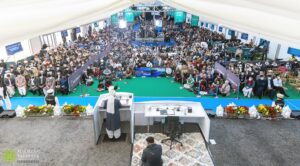
Following this, His Holiness highlighted the Promised Messiah’s (peace be upon him) instruction to those who take the Bai‘at (pledge of allegiance) to avoid lying, emphasising that falsehood is a grave evil. He referenced the Quranic verse: “Shun therefore the abomination of idols, and shun all words of untruth” (Chapter 22, Verse 31), underscoring the spiritual harm of dishonesty. A saying of the Holy Prophet (peace and blessings of Allah be upon him), which His Holiness cited, further reinforced the severity of lying in one’s character.
Hazrat Mirza Masroor Ahmad said:
“A Hadith mentions that the Holy Prophet (peace and blessings of Allah be upon him) said there are four traits which, if found in a person, make him a pure hypocrite. And if even one of these traits of hypocrisy is found in him, he remains impure until he gives it up. And those four traits are: One, when he speaks, he uses false rhetoric (i.e., mixes lies into his speech). Second, when he makes a covenant, he commits treachery. Third, when he makes a promise, he breaks his promise – this is also a form of lying. Fourth, when he quarrels, he uses abusive language.”
Hazrat Mirza Masroor Ahmad continued:
“The Holy Prophet (peace and blessings of Allah be upon him) said: ‘Truthfulness guides towards virtue, and virtue guides towards Paradise. Beware of lying, for lying leads to disobedience, and disobedience leads to Hell.’ Here lying is placed in comparison to an idol, and in reality, a lie is also an idol; otherwise, why would one abandon truth for something else? Thus, an Ahmadi, a believer, who has taken the Bai’at (pledge of allegiance) of the Promised Messiah (peace be upon him), must pay special attention to how much we should detest lying because it is taking us to Shirk (associating partners with God).”
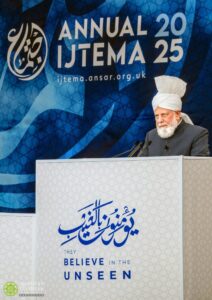
Turning to another matter, His Holiness stressed that fulfilling the conditions of the Bai‘at (pledge of allegiance) requires safeguarding oneself from vices, including adultery or fornication. Highlighting modern challenges, His Holiness noted that inappropriate programmes on TV or the internet can lead even older people towards such evils, stressing the importance of avoiding content that could provoke improper thoughts and actions.
His Holiness once more referred to the guidance of the Promised Messiah (peace be upon him), emphasising that those who enter his pledge must remain free of dishonesty and treachery, and never seize what is not theirs through mischief or harm. He added that Ahmadis must also avoid disorder and rebellion, instead demonstrating patience, responding to evil with goodness, and upholding the law of the land.
Hazrat Mirza Masroor Ahmad said:
“Respond to evil with goodness. And if someone is intent on creating disorder, it is better that you leave that place and give a soft answer. Thus, to demonstrate this example, it is necessary to strictly safeguard oneself from such things, and for this, we should also pray for our opponents. Not just avoiding them, but prayer is also essential. So, forAhmadi Muslims, and especially for you Ansarullah or those Ahmadi Muslims who have to conduct the moral training of the world and the moral training of your own generations, it is essential to avoid all methods of rebellion. No form of rebellion should exist in our nature or our actions.”
During the address, His Holiness underscored that on the Day of Judgment the very first matter for which one will be held accountable is Prayer, and thus success lies in safeguarding the five daily prayers with sincerity and humility before God. He further urged Ahmadi Muslims to give attention to the Tahajjud prayer (voluntary night prayer), describing it as a means of attaining nearness to God, avoiding sin and protecting from ills. Alongside this, His Holiness highlighted the importance of sending Durood (invoking salutations) upon the Holy Prophet (peace and blessings of Allah be upon him), noting that it brings manifold blessings and ensures that one’s prayers are presented before Allah the Almighty.
His Holiness stated:
“Given the current situation of the world, it is necessary that we turn to Allah the Almighty and pay special attention to sending Durood”.
Hazrat Mirza Masroor Ahmad continued:
“It is also necessary for an Ahmadi that he regularly seeks Istighfar (forgiveness). Istighfar should be offered along with Durood (invoking salutations), and the Ansar should become a role model for this. The Holy Prophet (peace and blessings of Allah be upon him) said that whoever holds fast to making Istighfar, meaning whoever offers it regularly, Allah the Almighty creates a way out for him from every difficulty, and creates a path of ease for him from every hardship, and grants him sustenance from sources he cannot even fathom.”

Nearing the end of the address, His Holiness said that fulfilling the rights of others also means protecting them from hardship and praying for the relief of oppressed people, particularly Muslims suffering around the world, that they may also recognise the Imam of the age. His Holiness reminded attendees that the Promised Messiah (peace be upon him) warned against responding to abuse with abuse, especially whilst preaching the peaceful message of Islam, noting that this is contrary to the spirit of the Ahmadiyya Muslim Community and displeases God Almighty. Instead, His Holiness stressed that anger must be responded to with humility and piety.
Whilst concluding, His Holiness reiterated that it is necessary for Ahmadi Muslims to understand and act upon the conditions of the Bai’at (pledge of allegiance).
Hazrat Mirza Masroor Ahmad stated:
“One should study and reflect upon the Conditiosn of Bai’at from time to time. One should keep pondering over it, especially the Ansar, so that it is easy for them to train their generations.”
Hazrat Mirza Masroor Ahmad prayed:
“May Allah the Almighty grant every one of you the ability to become a true Nāsir. And the slogan of ‘Nahnu Ansarullah’ (We are the Helpers of Allah) that you raise should, in reality, be such a slogan that belongs to those people who are fulfilling the mission of the Promised Messiah (peace and blessings be upon him). And for this, every Nāsir, every member of Majlis Majlis Ansarullah, should become a beneficial member for the Ahmadiyya Muslim Community and also one who supports their generations, so that the Ahmadiyya Muslim Community may remain firmly on the path of progress.”
His Holiness then led the congregation in a silent prayer.
